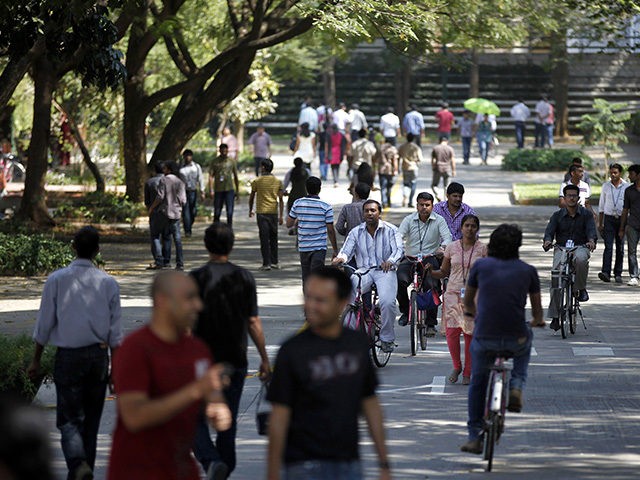President Donald Trump’s popular June 22 curbs on H-1B visa workers should be blocked because U.S. CEOs now rely on foreign workers, says a lawsuit by the U.S. Chamber of Commerce.
“Many of Plaintiffs’ members have collectively hired tens of thousands of individuals who are reliant upon the H-1B, H-2B, L-1, or J-1 visa categories to enter and work in the United States,” said the July 21 lawsuit.
Trump’s “Proclamation constitutes a massive upheaval of immigration programs that have functioned for decades [that] drastically upsets settled reliance interests, as businesses depend on the access to talent that these visa categories provide.”
“That is just outrageous,” responded Rosemary Jenks, policy director of NumbersUSA.
“The idea that they would be clamoring for cheap foreign labor right now is obscene –they have completely lost touch with reality” amid the coronavirus crash, she said, adding:
If you’re doing business in the United States, you should create a business based on American labor and livable wages. There are many companies that do that [because] there is plenty of labor in the country to fill all these jobs.
The lawsuit is fueled by corporate greed, she said:
The reasons that businesses are created in the United States, the reasons we have greater entrepreneurship, is because of the entire system we have — infrastructure, laws, and fair policies. So for these employers to say ‘I’m going to take advantage of all of that, of U.S. taxpayers and customers, but I’m not going to participate in the U.S. labor market’ … is pure greed.
Companies have imported at least 1.3 million white-collar visa workers, including roughly 600,000 H-1B visa workers, roughly 500,000 “Practical Training” workers, 100,000 H4EAD workers, plus roughly 100,000 people with T.N., J-1, and other visas. The chamber says 580,000 H-1B workers are in the United States.
Companies also employ hundreds of thousands of blue-collar foreign workers, including up to 100,000 H-2B laborers, at least 250,000 H-2A visa workers, plus myriad J-1 workers.
In addition, the United States accepts one million legal immigrants per year, as four million young Americans enter the workforce.
These large populations of legal foreign workers also provide cover for CEOs at Fortune 500 companies to hire many illegal white-collar workers via a vast network of subcontractors. This illegal population includes many white-collar overstays plus many people who work jobs after legally entering on B-1 visitor visas.
The resulting flood of extra labor helps to force down Americans’ salaries and wages, including for new graduates as well as experienced workers.
The Chamber lawsuit insists that U.S. employers cannot hire trained or inexperienced Americans for these jobs: “American firms, particularly in manufacturing and certain STEM fields, face a structural shortage of domestic workers qualified and available to fill the roles needed for the companies to perform.”
Yet the Chamber also suggests that its members are entitled to hire the “best talent” worldwide, regardless of the skills and wages in the nation’s labor market:
The [Trump] Proclamation stunts the ability of businesses to identify the best talent for a position; indeed, it causes many important positions to go unfilled entirely, stalling projects that would otherwise create jobs.
The Chamber notes that the H-1B program can increase the number of jobs in the United States. But it dodges the damaging impact on the American professionals who are pushed out of engineering careers into retail or food-service jobs, or the young American graduates who never get the skilled jobs they need to repay their college loans.
The fact that the labor supply effects wages is Economics 101. Amid evasive denials by immigration advocates, the fact has been acknowledged by independent academics, the National Academies of Science, the Congressional Budget Office, executives, The Economist globalist weekly, more academics, the New York Times, the New York Times again, state officials, unions, more business executives, lobbyists, employees, the Wall Street Journal, federal economists, Goldman Sachs, oil drillers, the Business Roundtable, the Bank of Ireland, Wall Street analysts, fired professionals, legislators, the CEO of the U.S. Chamber of Commerce, 2015 Bernie Sanders, the Wall Street Journal’s editorial board, construction workers, New York Times subscribers, Robert Rubin, a New York Times columnist, author Barack Obama, and President Barack Obama.
However, the lawsuit asks for “a declaratory judgment establishing that the Proclamation is in excess of the Executive Branch’s lawful authority; (b) enjoin Defendants from implementing, enforcing, or otherwise carrying out the provisions of the Proclamation.”
The chamber lobbied aggressively against Trump’s June 22 policy.
The popular policy bars the inflow of H-1B, L-1, and J-1 workers for at least the rest of the year, and it also directs agency officials to rewrite regulations to ensure these programs do not block young Americans from getting jobs.
Business lobbies and their friends inside the White House will fight hard to stop the regulation rewrites, while grassroots lobby groups of U.S. professionals will push for the regulations.
Follow Neil Munro on Twitter @NeilMunroDC, or email the author at NMunro@Breitbart.com.

COMMENTS
Please let us know if you're having issues with commenting.